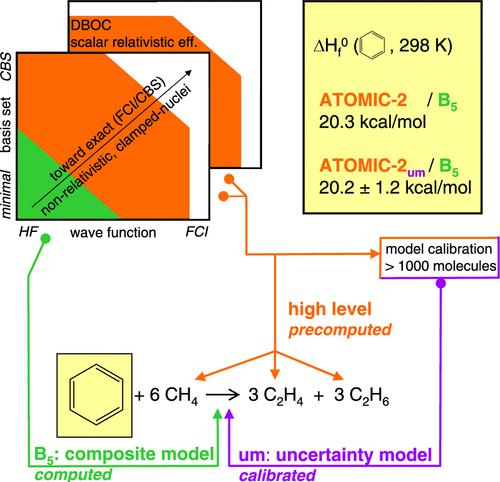当前位置:
X-MOL 学术
›
J. Chem. Theory Comput.
›
论文详情
Our official English website, www.x-mol.net, welcomes your
feedback! (Note: you will need to create a separate account there.)
ATOMIC-2 Protocol for Thermochemistry
Journal of Chemical Theory and Computation ( IF 5.7 ) Pub Date : 2022-06-03 , DOI: 10.1021/acs.jctc.1c01272 Dirk Bakowies 1
Journal of Chemical Theory and Computation ( IF 5.7 ) Pub Date : 2022-06-03 , DOI: 10.1021/acs.jctc.1c01272 Dirk Bakowies 1
Affiliation

|
ATOMIC is a midlevel thermochemistry protocol that uses Pople’s concept of bond separation reactions (BSRs) as a theoretical framework to reduce computational demands in the evaluation of atomization energies and enthalpies of formation. Various composite models are available that approximate bond separation energies at the complete-basis-set limit of all-electron CCSD(T), each balancing computational cost with achievable accuracy. Evaluated energies are then combined with very high-level, precomputed atomization energies of all auxiliary molecules appearing in the BSR to obtain the atomization energy of the molecule under study. ATOMIC-2 is a new version of the protocol that retains the overall concept and all previously defined composite models but improves on ATOMIC-1 in various other ways: Geometry optimization and zero-point-energy evaluation are performed at the density functional level (PBE0-D3/6-311G(d)), which shows significant computational savings and better accuracy than the previously employed RI-MP2/cc-pVTZ. The BSR framework is improved, using more accurate complete-basis-set (CBS) extrapolations toward the Full CI limit for the atomization energies of all auxiliary molecules. Finally, and most importantly, an error and uncertainty model termed ATOMIC-2um is added that estimates average bias and uncertainty for each of the atomization energy contributions that arise from the simplified treatment of some contributions to bond separation energies (CCSD(T)) and the neglect of others (such as higher order, scalar relativistic, or diagonal Born–Oppenheimer corrections) or from residual error in the energies of auxiliary molecules. Large and diverse benchmarks including up to 1179 molecules are used to evaluate necessary reference data and to correlate the observed error for each of the contributions with appropriate proxies that are available without additional quantum-chemical calculations for a particular molecule and represent its size and type. The implementation of ATOMIC-2 considers neutral, closed-shell molecules containing H, C, N, O, and F atoms; compared to ATOMIC-1, the framework has been extended to cover a few challenging but rare bond topologies. In comparison to highly accurate reference data for 184 molecules taken from the ATcT database (V. 1.122r), regular ATOMIC-2 shows noticeable underbinding, but the bias-corrected protocol ATOMIC-2um is found to be more accurate than either ATOMIC-1 or standard Gaussian-4 theory, and the uncertainty model is consistent with statistics of actually observed errors. Problems arising from ambiguous or challenging Lewis-valence structures defining BSRs are discussed, and computational efficiency is demonstrated. Computer code is made available to perform ATOMIC-2um analyses.
中文翻译:

ATOMIC-2 热化学协议
ATOMIC 是一种中级热化学协议,它使用 Pople 的键分离反应 (BSR) 概念作为理论框架,以减少评估原子化能量和形成焓的计算需求。有多种复合模型可用于在全电子 CCSD(T) 的完整基集极限下近似键分离能,每种模型都平衡了计算成本和可实现的精度。然后将评估的能量与出现在 BSR 中的所有辅助分子的非常高水平、预先计算的原子化能量相结合,以获得所研究分子的原子化能量。ATOMIC-2 是协议的新版本,它保留了整体概念和所有先前定义的复合模型,但在 ATOMIC-1 上以各种其他方式进行了改进:几何优化和零点能量评估是在密度函数级别 (PBE0-D3/6-311G(d)) 执行的,与以前使用的 RI-MP2/cc-pVTZ 相比,这显示出显着的计算节省和更好的精度。BSR 框架得到改进,对所有辅助分子的原子化能量使用更准确的完全基组 (CBS) 外推法向全 CI 限制。最后,也是最重要的,称为 ATOMIC-2 的误差和不确定性模型嗯添加了估计每个原子化能量贡献的平均偏差和不确定性,这些贡献来自于对键分离能量 (CCSD(T)) 的一些贡献的简化处理和对其他贡献的忽略(例如高阶、标量相对论或对角线) Born-Oppenheimer 校正)或来自辅助分子能量的残余误差。包括多达 1179 个分子的大型和多样化的基准用于评估必要的参考数据,并将每个贡献的观察到的误差与适当的代理相关联,这些代理无需对特定分子进行额外的量子化学计算并代表其大小和类型。ATOMIC-2 的实现考虑了包含 H、C、N、O 和 F 原子的中性闭壳分子;与 ATOMIC-1 相比,该框架已扩展到涵盖一些具有挑战性但罕见的债券拓扑。与来自 ATcT 数据库 (V. 1.122r) 的 184 个分子的高度准确的参考数据相比,常规 ATOMIC-2 显示出明显的下绑定,但偏差校正协议 ATOMIC-2um被发现比 ATOMIC-1 或标准 Gaussian-4 理论更准确,并且不确定性模型与实际观察到的误差的统计数据一致。讨论了由定义 BSR 的模棱两可或具有挑战性的路易斯价结构引起的问题,并证明了计算效率。计算机代码可用于执行 ATOMIC-2 um分析。
更新日期:2022-06-03
中文翻译:

ATOMIC-2 热化学协议
ATOMIC 是一种中级热化学协议,它使用 Pople 的键分离反应 (BSR) 概念作为理论框架,以减少评估原子化能量和形成焓的计算需求。有多种复合模型可用于在全电子 CCSD(T) 的完整基集极限下近似键分离能,每种模型都平衡了计算成本和可实现的精度。然后将评估的能量与出现在 BSR 中的所有辅助分子的非常高水平、预先计算的原子化能量相结合,以获得所研究分子的原子化能量。ATOMIC-2 是协议的新版本,它保留了整体概念和所有先前定义的复合模型,但在 ATOMIC-1 上以各种其他方式进行了改进:几何优化和零点能量评估是在密度函数级别 (PBE0-D3/6-311G(d)) 执行的,与以前使用的 RI-MP2/cc-pVTZ 相比,这显示出显着的计算节省和更好的精度。BSR 框架得到改进,对所有辅助分子的原子化能量使用更准确的完全基组 (CBS) 外推法向全 CI 限制。最后,也是最重要的,称为 ATOMIC-2 的误差和不确定性模型嗯添加了估计每个原子化能量贡献的平均偏差和不确定性,这些贡献来自于对键分离能量 (CCSD(T)) 的一些贡献的简化处理和对其他贡献的忽略(例如高阶、标量相对论或对角线) Born-Oppenheimer 校正)或来自辅助分子能量的残余误差。包括多达 1179 个分子的大型和多样化的基准用于评估必要的参考数据,并将每个贡献的观察到的误差与适当的代理相关联,这些代理无需对特定分子进行额外的量子化学计算并代表其大小和类型。ATOMIC-2 的实现考虑了包含 H、C、N、O 和 F 原子的中性闭壳分子;与 ATOMIC-1 相比,该框架已扩展到涵盖一些具有挑战性但罕见的债券拓扑。与来自 ATcT 数据库 (V. 1.122r) 的 184 个分子的高度准确的参考数据相比,常规 ATOMIC-2 显示出明显的下绑定,但偏差校正协议 ATOMIC-2um被发现比 ATOMIC-1 或标准 Gaussian-4 理论更准确,并且不确定性模型与实际观察到的误差的统计数据一致。讨论了由定义 BSR 的模棱两可或具有挑战性的路易斯价结构引起的问题,并证明了计算效率。计算机代码可用于执行 ATOMIC-2 um分析。











































 京公网安备 11010802027423号
京公网安备 11010802027423号